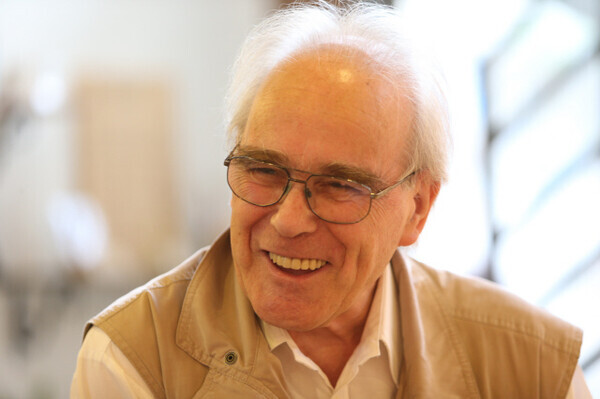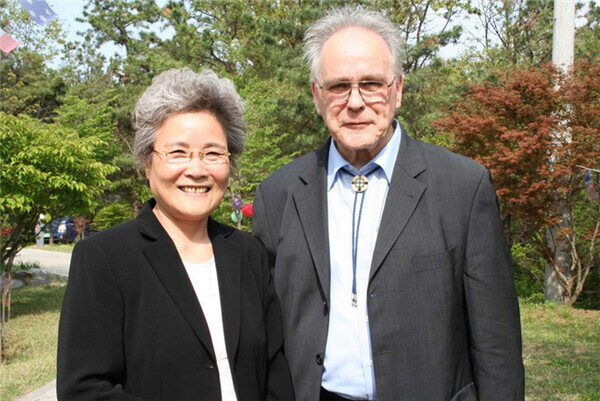hankyoreh
Links to other country sites 다른 나라 사이트 링크
German missionary who helped broadcast Gwangju Uprising to world dies at 88

Paul Schneiss, a German pastor who raised global awareness about the Gwangju Uprising and other episodes in South Korea’s pro-democracy movement during the 1970s and 1980s, passed away early on Friday morning. He was 88 years old.
The Korea Democracy Foundation reported the news of Schneiss’ passing on Friday. “He consistently supported Korea’s pro-democracy movement in the face of numerous difficulties under brutal military governments and brought that movement to the world’s attention. With gratitude for his dedication to the cause of Korean democracy, we will continue his mission of working together for the cause of peace and justice,” the foundation said.
Born to a missionary family in China in 1933, Schneiss studied theology in Germany and began working as a missionary in Japan in 1958. He traveled between Korea and Japan in the 1970s while working with Deutsche Ostasienmission, a German missionary organization active in East Asia.
After Park Chung-hee installed his Yushin regime, Schneiss regularly shared news about Korea’s pro-democracy movement with other countries. He was on hand to observe Park’s mass arrests of student protesters associated with the National Democratic Youth-Student League in 1974 and the trial following the March 1 “Declaration for the Salvation of the Nation” in 1976.

Schneiss also served as a liaison between pro-democracy activists inside Korea and those overseas. In 1975, he secretly forwarded Korean documents to Ji Myung-gwan, a professor in Tokyo, who wrote a series of columns for Japanese current events magazine Sekai under the pseudonym “Born in TK” — where TK stands for Daegu and North Gyeongsang Province.
The Korean government deported Schneiss to Hong Kong in December 1978. While he was banned from entering the country, his wife Kiyoko and children visited Seoul in his stead.
After Kiyoko told him that she had witnessed troop movements in Seoul during the Gwangju Uprising in May 1980, Schneiss visited the Tokyo branch of German broadcaster NDR and asked reporter Jürgen Hinzpeter to cover the story. Hinzpeter was the real-life inspiration behind the 2017 Korean film “A Taxi Driver.”
Hinzpeter sent the original footage he shot during the government’s bloody crackdown of the Gwangju Uprising to Germany and had the Betamax broadcasting tapes copied and forwarded to Schneiss. Those copies were passed along to Amnesty International and other groups, which helped bring the atrocities in Gwangju to the world’s attention.
Schneiss and his family visited Korea more than 200 times to collect information and write books about Korea’s pro-democracy movement. He and his wife later donated related documents to the Korean government, which earned them the Mothers of May award in 2011.
Last year, Schneiss was awarded a merit prize by the May 18 Memorial Foundation and was also honored by the Korean government for contributing to the country’s democracy.
By Lee Woo-yun, staff reporter
Please direct questions or comments to [english@hani.co.kr]

Editorial・opinion
![[Column] Park Geun-hye déjà vu in Yoon Suk-yeol [Column] Park Geun-hye déjà vu in Yoon Suk-yeol](https://flexible.img.hani.co.kr/flexible/normal/500/300/imgdb/original/2024/0424/651713945113788.jpg) [Column] Park Geun-hye déjà vu in Yoon Suk-yeol
[Column] Park Geun-hye déjà vu in Yoon Suk-yeol![[Editorial] New weight of N. Korea’s nuclear threats makes dialogue all the more urgent [Editorial] New weight of N. Korea’s nuclear threats makes dialogue all the more urgent](https://flexible.img.hani.co.kr/flexible/normal/500/300/imgdb/original/2024/0424/7317139454662664.jpg) [Editorial] New weight of N. Korea’s nuclear threats makes dialogue all the more urgent
[Editorial] New weight of N. Korea’s nuclear threats makes dialogue all the more urgent- [Guest essay] The real reason Korea’s new right wants to dub Rhee a founding father
- [Column] ‘Choson’: Is it time we start referring to N. Korea in its own terms?
- [Editorial] Japan’s rewriting of history with Korea has gone too far
- [Column] The president’s questionable capacity for dialogue
- [Column] Are chaebol firms just pizza pies for families to divvy up as they please?
- [Column] Has Korea, too, crossed the Rubicon on China?
- [Correspondent’s column] In Japan’s alliance with US, echoes of its past alliances with UK
- [Editorial] Does Yoon think the Korean public is wrong?
Most viewed articles
- 1‘We must say no’: Seoul defense chief on Korean, USFK involvement in hypothetical Taiwan crisis
- 2Will NewJeans end up collateral damage in internal feud at K-pop juggernaut Hybe?
- 3[Column] Park Geun-hye déjà vu in Yoon Suk-yeol
- 4Why Korea shouldn’t welcome Japan’s newly beefed up defense cooperation with US
- 5Thursday to mark start of resignations by senior doctors amid standoff with government
- 6N. Korean hackers breached 10 defense contractors in South for months, police say
- 7[Guest essay] The real reason Korea’s new right wants to dub Rhee a founding father
- 8[Column] ‘Choson’: Is it time we start referring to N. Korea in its own terms?
- 9Kim Jong-un expressed ‘satisfaction’ with nuclear counterstrike drill directed at South
- 10[Editorial] New weight of N. Korea’s nuclear threats makes dialogue all the more urgent